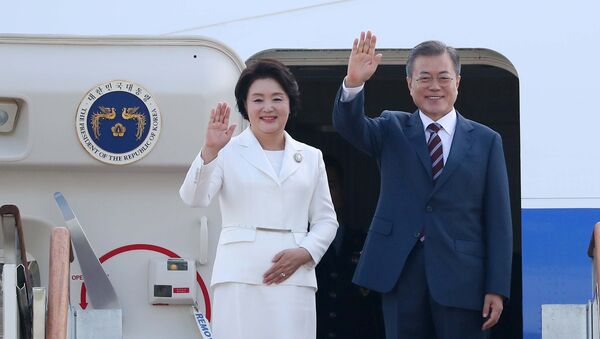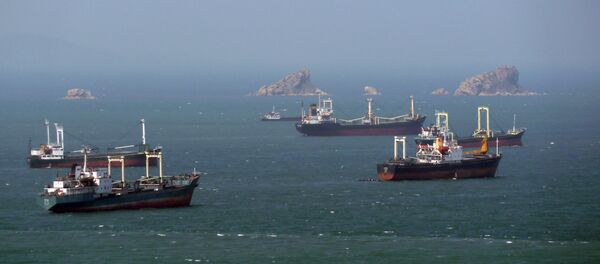South Korea's President has arrived in the North Korean capital for his third meeting with the country's leader. According to the Sputnik correspondent on the scene, residents of Pyongyang carried banners that said "The united forces of the nation will open an era of peace and prosperity" and "We warmly welcome the visit of President Moon Jae-in to Pyongyang". Moon's visit to Pyongyang is the first by a South Korean leader in 11 years.
Nagy Stephen Robert: What we should expect at the meetings is President Moon trying to create an atmosphere that sends a message to Washington that North Korea is sincere about denuclearization and economic development and that South Korea represents a partner that can help in both of those endeavors — to be a messenger to Washington between North Korea and Washington, and South Korea can help the North with its economic development strategy. What we'll see in the coming days, today and tomorrow, is both leaders discuss peace and different kinds of cultural exchanges, potentially some economic projects; but again, President Moon is going to try and secure some commitments from North Korea to the denuclearization process.
READ MORE: South Korean President Moon Jae-in, DPRK's Leader Kim Jong-un Meet in Pyongyang
Sputnik: Assuming this is Moon Jae's first visit to North Korea, how significant is it? I was just reading in the news that it's been quite a long time since the last leader of South Korea visited the North of the peninsula; it's very significant, it goes on the back of the meeting with President Trump in Singapore. It's very significant for the North Korean Leader; he does seem to be making strides to develop peace and move things forward. You have to give him credit for that, don't you?
Nagy Stephen Robert: I think it's significant for President Moon, both on a personal and a political level. As for Kim Jong-un, it's a very significant visit by the South Korean leader, because it really acknowledges his position as the defender of political power in North Korea that the South Korean leader is coming. They are spending two days in Pyongyang, which is quite significant; they're coming to engage in a dialogue.
Going back to President Moon, we should understand his roots, his family comes from North Korea so it's meaningful for Moon to go back and visit the land of his ancestors. At a political level, it does demonstrate that Moon's policy Sunshine 2.0 is moving forward. There are some benefits and some kind of rapprochement between the two capitals and he is really directing the reunification process in a way that is gaining momentum.
READ MORE: South Korean President Departs for Peace Talks in Pyongyang
Sputnik: How would you assess the progress in relations between North and South Korea in recent years? There has been some dialogue but this is obviously significant. You've mentioned some elements of what their meeting is about, but what strategically is the biggest thing they want to achieve?
Nagy Stephen Robert: What's really important to come out of this meeting will be a commitment by North Korea and solid action to begin the denuclearization process. This could be an accounting of what kinds of systems and capabilities they have; perhaps, they could be giving some micro-weapons to third countries. But it has to have some concrete take on, so when President Moon visits Washington next weekend and talks to President Trump, they will have some strong commitments that the denuclearization process is going forward.
READ MORE: N Korea Unlikely to Rush for Denuclearization in Inter-Korean Summit — Scholars
Sputnik: What are the main difficulties standing in the way of the peace process on the peninsula? I know you've been mentioning a couple of things with regard to denuclearization; what would you like to be agreed upon and discussed, from your view and your experience in commenting on these particular relations on the peninsula?
Nagy Stephen Robert: What's really important moving forward is that North Korea does make some steps towards the denuclearization process, but we've start to rethink the sequence in the process. Does a peace treaty come before denuclearization at some intermediary position that Washington and North Korea come to in terms of a peace treaty before denuclearization? Can the North demonstrate some commitment in terms of de-escalating tensions on the peninsula that will send the correct signal to Washington? There are a lot of things that can be done, but we have to find ways to find a compromise between Washington and North Korea, in a way that sets up the possibility to come to some kind of a peace treaty in the mid- or long-term.
READ MORE: Denuclearization to Become Key Issue at Moon-Kim Summit — Seoul
Sputnik: Perhaps, you could give our listeners an update of the current situation in relations between the United States and North Korea. Obviously, after the strategic meeting in Singapore a few months ago there has been a malaise in the relationship; there have obviously been comments and counter-comments from both parties. We've come across a little bit of a stumble and a couple of barriers. What's your take on the current situation? What needs to be done to try and bring the parties back together again?
Nagy Stephen Robert: The June summit between Trump and Kim was significant. That was the first time that the two leaders, of North Korea and the United States, came together face to face and had a discussion. I think it changed the tone and the optics and provided an opportunity for both countries to move forward. However, what we haven't seen is a real decrease in hostility between the two states.
North Korea is deeply skeptical about the US posture on the peninsula. Washington is equally skeptical about whether North Korea has committed to denuclearization, because on the ground we haven't seen any changes — we haven't seen an accounting of the nuclear missiles, the halting of the production of fissile materials that are used in nuclear weapons, or a change in how North Korea is talking about the importance of being a nuclear state, going forward.
The views and opinions expressed by Nagy Stephen Robert are those of the speaker and do not necessarily reflect those of Sputnik.





